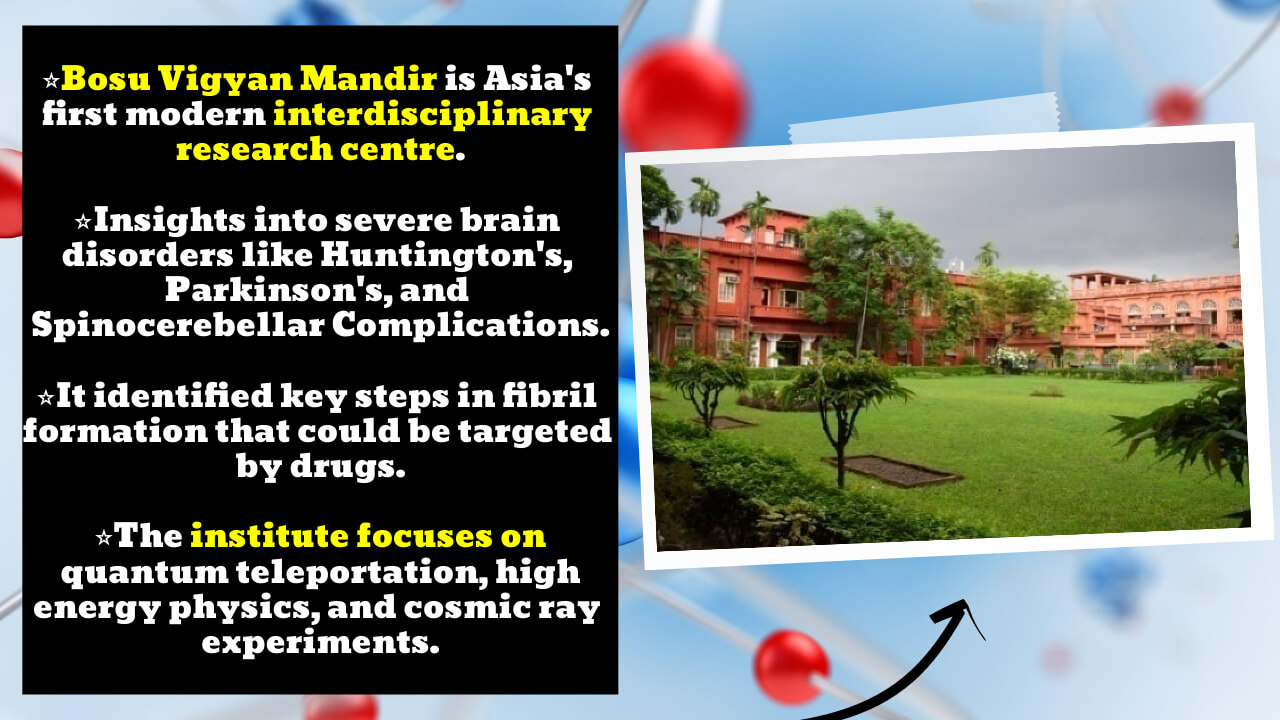Bosu Vigyan Mandir is Asia’s first modern interdisciplinary research centre. Insights into severe brain disorders like Huntington’s, Parkinson’s, and Spinocerebellar Complications. It identified key steps in fibril formation that drugs could target. The Bose Institute was founded in 1917. It houses three centers: the Center for Biotechnology Innovation, the Center for Bioinformatics Excellence, and Astrophysics and Space Science. The institute focuses on quantum teleportation, high-energy physics, and cosmic ray experiments.
Key Highlight:
- Bosu Vigyan Mandir is Asia’s first modern interdisciplinary research centre.
- It was founded by Acharya Jagadish Chandra Bose, the first person to start modern science in the Indian subcontinent.
- The institute focuses on quantum teleportation, high-energy physics, and cosmic ray experiments.
- It has found essential steps in making fibrils that can make drugs for diseases like Alzheimer’s, Parkinson’s, and Type-2 Diabetes.
- It also helps to find a drug target in Mycobacterium tuberculosis, which is the cause of tuberculosis, and figure out how homoplasy and pleiotropy are linked to the drug-resistance of Myc Cobacterium TB.
- The Bose Institute was chosen as the Institute of Repute for a clean air program in West Bengal.
The Bose Institute, or the Bosu Vigyan Mandir, is Asia’s first modern research center that focuses on research from different fields. It has made progress in a wide range of areas, from developing new treatments for severe brain disorders, neurodegenerative disorders, cancer, and infectious diseases, to designing, manufacturing, and supplying parts for an accelerator for a huge science project in Germany called the Facility for Antiproton-Ion Research (FAIR).
In the lab set up by Acharya Jagadish Chandra Bose, the first person to start modern science in the Indian subcontinent, they’ve found a way to treat brain disorders like Huntington’s, Parkinson’s, and Spinocerebellar complications with protein engineering and natural products. It has found essential steps in making fibrils that can make drugs for diseases like Alzheimer’s, Parkinson’s, and Type-2 Diabetes.
Having been around for more than a century, the institute is also part of many big science projects. It’s in charge of designing, making, and supplying items for accelerators, and it also helps coordinate Indian research at the Facility for Antiproton-Ion Research (FAIR) in Germany.
Government of India: It was chosen as the Institute of Repute for a clean air program in West Bengal. It has done a lot of research into how pollution affects low-lying clouds over the eastern Himalayas. This is part of the clean air program. The Bose Institute found that natural populations of mesophilic bacteria randomly exposed to extreme environments like hot springs in the Trans-Himalayan region could withstand high temperatures. It’s one of the institute’s primary goals to learn about critical chemical aspects of plant-microbe interactions in mangrove vegetation and how that impacts the environment.
Glycolipids GM2 and regulatory RNAs are also being looked at as possible targets for cancer treatment. It is also looking into how these biomolecules could fight cancer. It also helps to find a drug target in Mycobacterium tuberculosis, which is the cause of tuberculosis, and figure out how homoplasy and pleiotropy are linked to the drug-resistance of Mycobacterium tuberculosis through Genomic analysis.
The institute researches bioinformatics, biophysics, biochemistry, chemistry, microbiology, molecular medicine, plant biology, physics, environmental sciences, and many other new and emerging fields of science, as well as a lot of old ones.
In Bioinformatics, the institute is making databases like ClinicLSNP and DRAGdb that can be used in healthcare. They have found LncRNA loci with SNPs for the three most common female cancers in India: breast, cervical, and ovarian cancer. The institute uses genomic methods in agricultural sciences to make rice that can withstand salt and sesame that can resist diseases. Regarding physical sciences, the institute focuses on things like quantum teleportation, high-energy physics, international collaborations like ALICE and CBM, and cosmic ray experiments, as well as tuning the light-matter coupling in exciton-plasmon (2D-0D) systems for use in optoelectronic devices like LEDs and lasers.
It looked into how over-spraying hypochlorite solution (a surface disinfectant used to stop the spread of Covid-19) would affect the atmosphere and public health during the pandemic. It also looked into drugs and molecules that could be used against COVID19, and it did high-throughput virtual screening for repurposing drugs and their analysis with the SARS CoV-2 E-protein. The institute also used X-ray crystallography and Cryo-Electron microscopy to look at important immunologically relevant macromolecular complexes, which helped them learn more about inflammatory and autoimmune diseases.
The Bose Institute, founded on November 30, 1917, has three centers: the Center for Biotechnology Innovation, the Center for Excellence in Bioinformatics, and the Center for Astroparticle Physics and Space Science. It has a lot of National and International collaborations.
It wants to spread its wings and look into how non-coding RNAs play a role in cancer development. It also wants to look into how anthropogenic factors and antibiotic resistance are linked in the natural world. It also wants to look into how carbohydrate-based anti-microbial vaccine candidates can be made and how 2D semiconducting materials can be made.






[…] Bose Institute advances with breakthrough treatments, mega-science projects, and pollution control […]